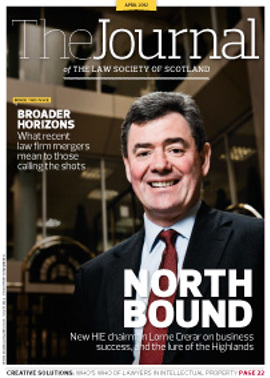Feedback, take 2

A stormy arrival for alternative business structures, threats to legal aid and access to justice, the introduction of a new complaints system, a lengthy and deep recession – the changes faced by Scottish solicitors in recent years have been extensive and profound.
Partly in response to the changes taking place, but also because it was considered long overdue, the Society conducted in-depth research among its members in 2009 to ensure it was meeting its commitment to provide relevant and effective services. Three years on, a follow-up survey has been carried out to measure progress and identify further areas where the Society could improve the way it works.
Independent research
The Society’s marketing manager, Angus Maclauchlan, says: “It’s important for any membership organisation to get detailed feedback from its members on a fairly regular basis. Given the pace of change recently experienced by the legal profession, we thought it useful to measure members’ perceptions of and priorities for the Society, as well as feedback on specific services.”
Maclauchlan adds that the new research was based on a telephone survey conducted by Ipsos MORI and an online consultation carried out by the Society. Ipsos MORI designed the telephone survey to ensure that the views and experiences of a cross-section of the profession were captured. In total, 573 interviews were conducted, allowing detailed analysis to be carried out and robust conclusions to be drawn, which will help the Society improve its services to members. The online consultation, which covered a broad range of issues relevant to the whole membership, received 1,119 responses – 10% of members.
Mark Diffley, director at Ipsos MORI, explains: “It is vital that the Society receives honest, reliable and independently-collected feedback from its members. So, we designed the survey to ensure that we could cover the breadth of the Society’s services in-depth among solicitors from all areas, types of firms and legal backgrounds. We found the vast majority of members eager to participate and tell us their views.”
Maclauchlan continues: “We are enormously grateful to the members who took the time to complete the online survey and those who were interviewed by Ipsos MORI. The information generated has helped us identify a number of areas we can work on to improve our services to members. The real proof of our progress will be when we go back to our members in the future to again ask for their views on how we have improved our performance.”
Society chief executive Lorna Jack points out that the research also provided an opportunity to test the objectives and priorities set out in the Society’s Towards 2020 strategy, published in September last year. “It is vital that we provide effective services for our members, particularly when so many are facing difficult decisions in a prolonged economic downturn”, she says. “Our strategy for the decade ahead sets the aim of leading and supporting a successful and respected solicitors’ profession. Feedback from our members is crucial for us to achieve that goal.”
Service levels
Neil Stevenson, Director of Representation and Professional Support, sums up the findings of the research. “Some of the conclusions are really encouraging. But at the same time, we are in no way complacent – there are areas that we need to work on further. A number of questions differed to those asked several years ago, but others allowed us to make direct comparisons.
“Regulatory work remains a high priority and is also considered to be performing well, with 76% believing the Society is an effective regulator of the profession. As a core function, it’s encouraging to see that members understand the balance between robust regulation and allowing solicitors to get on with doing their jobs.”
In other areas of work, he says, members viewed customer service favourably, with signs of improvement since the previous research – 81% of respondents agreeing that Society staff were polite and helpful, and 71% that those dealing with enquiries were well informed. Stevenson adds that the Update team scored well, with a 68% satisfaction rating, while the professional practice helpline was very highly rated, averaging a 91% satisfaction rating.
He says: “Despite the fact that those who used the helpline had an incredibly positive experience, it looks as though more can be done to make sure each and every member knows the service is available and that the team’s solicitors are constantly there to give expert support and guidance to the profession.
“I also believe the new database and login system will lead to a strong shift to more tailored communications with particular groups of members. Hopefully that will ensure we are better able to communicate the work we do and the value we provide, while allowing members to get involved. Members can help us with this by logging on and setting their preferences, especially around their areas of work. This will help ensure they get the best information for them and cut down on less directly applicable material. At the same time, we are delighted at the launch of Update Online, which will allow members to carry out CPD without the need to travel, though we also continue to run events across the country.”
Difficult areas
Stevenson recognises that some key groups, often overlapping, were less positive about the Society, such as those working in legal aid, high street firms, rural practitioners and solicitors with lengthy experience. But action is being taken to address those issues, he insists.
“We know that the big issue for many within those groups at the moment is the commercial environment and I think some of the dissatisfaction is coming from business pressure. A series of roadshows in May will be aimed at providing help and support around new business structures and the business climate.
“We have also introduced new resources into our legal aid work, with additional solicitor staff at the Society working closely with an evolving committee structure of practitioners. And we are investing in improving our data to communicate better with members in legal aid. Rural practitioners also face challenging circumstances and we are very closely monitoring the situation with possible court closures and threats to access to justice.”
Higher profile
Other areas for improvement include improving members’ perceptions of the Society in line with the ambitions contained in the Towards 2020 strategy. The numbers who strongly agree that the Society is effective at leading and supporting the legal profession (63%) and is a high-performing organisation (50%) could, and should, both be higher, Stevenson says. Likewise, there is clearly work to be done developing the role of Council members, as 86% of respondents had never been in contact with their local representative.
Stevenson adds: “Internally, we have again been accredited for Investors in People, so we are confident we have the right people to take us forward, but we need to be out engaging with all our member groups. The faculty newsletter from the Society to faculty deans is a relatively new development and we are looking at how we can build more links between Council members and faculties. We also recently met with faculty deans to discuss closer working. We have also raised the profile of Council members on the website and have received a positive response to the monthly profile of a Council member in the Journal.”
In conclusion? “Conducting the research has been a really positive exercise because it shows what we are doing right and where we can improve. In each of the areas where improvement is needed, we are putting specific plans in place and we will come back again to measure our progress.”
In this issue
- Data protection principles and family practice
- Data protection: another generation
- No guarantee of easy recovery
- Forced marriage: alive to the issue
- Mediation: business as usual?
- Electronic payments and electronic money
- Reading for pleasure
- Opinion column: Gillian Mawdsley
- Council profile
- Book reviews
- President's column
- Caution the souvenir hunters
- Together we thrive
- But you said...
- Heart in the Highlands
- Cut the lockup cost
- Who's who in intellectual property
- Taking liberties with bail
- Personal licences: a need for review?
- TUPE: fair or unfair for staff?
- 10%: a real gain?
- Renovating home PDRs
- Ademption and powers of attorney
- Working group to take forward ILG review
- Law reform roundup
- From the Brussels office
- Feedback, take 2
- Chinks in your defences?
- Business checklist
- Ask Ash






